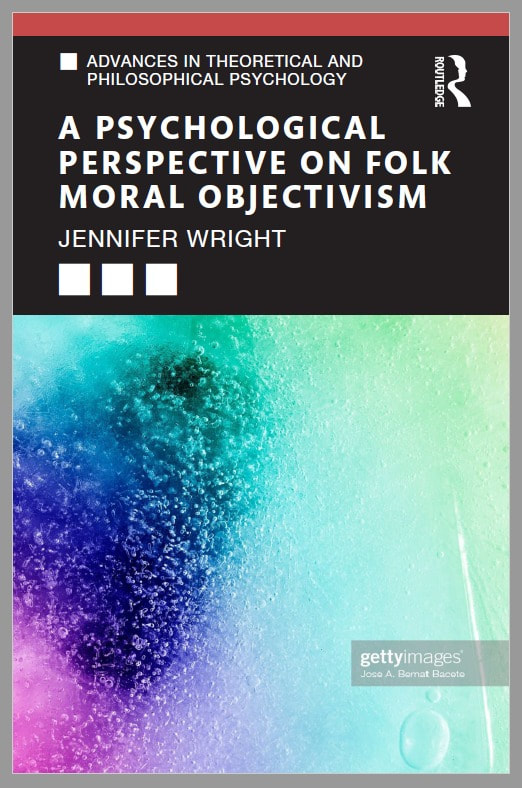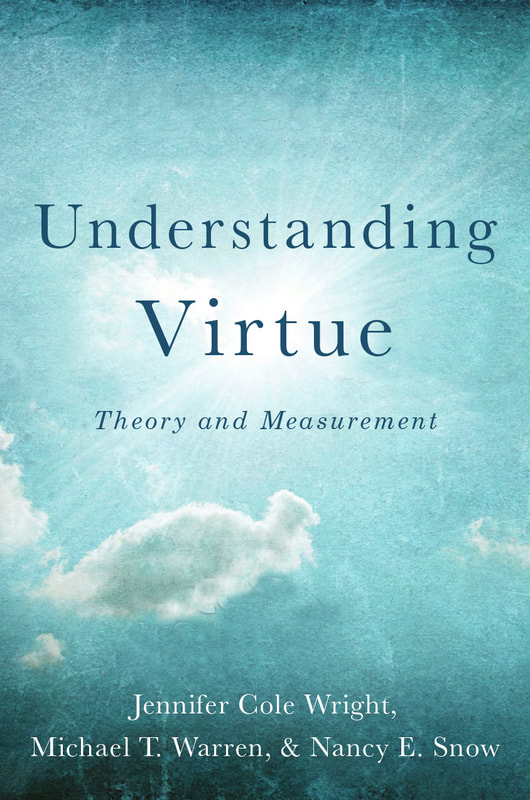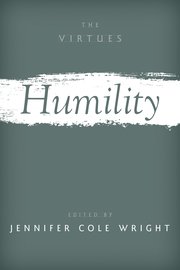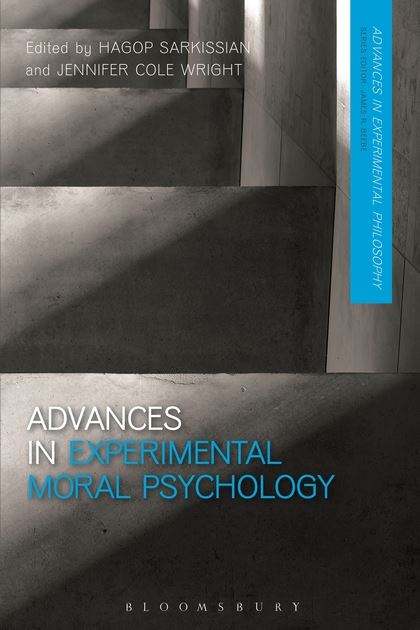PUBLICATIONS by topic area (copies available upon request) # in progress, * under review
Virtue
Humility
Morality as a Regulator of Divergence
Meta-Ethical Pluralism/Folk Meta-Ethics
Moral Conviction
Moral Foundation Theory
Moral Epistemology
Early Moral Cognition/Moral Learning
Intuitional Stability
Other Experimental Philosophy
Other Articles
Virtue
- Wright, J.C., Warren, M, & Snow, N. (2020). Understanding Virtue: Theory and Measurement. Oxford University Press.
- Warren, M.T., Wright, J.C., & Snow, N.E. (2022). Against neutrality: Response to Cokelet. Journal of Moral Education, 111-116.
- Snow, N., Wright, J.C., & Warren, M. (2021). Phronesis and whole trait theory: An integration. In (De Caro & Vaccarezza Eds.) Practical Wisdom. Philosophical and Psychological Perspectives, Routledge Press.
- Wright, J.C. (2020). Commentary on The Character Gap: A case for vice. Journal of Philosophical Research, 44, 213-224.
- Wright, J.C., Snow, N., & Warren, M. (2020). Suffering, virtue, and character: Why the science of virtue matters. Invited Contribution to special issue of Acta Philosophica - Monographic Issue, 47.
- Snow, N., Wright, J.C., & Warren, M. (2019). Virtue measurement: Theory and applications. Invited Contribution to special issue of Ethical Theory and Moral Practice.
Humility
- Wright, J.C. (Ed.). (2019). Humility. Oxford Series on The Virtues; Oxford University Press.
- Wright, J.C. (2023). Humility is the foundation to a virtuous life. The Conversation. theconversation.com/humility-is-the-foundation-to-a-virtuous-life-207897.
- Wright, J.C. (2022). The psychology of humility. In J. Steinberg (Ed.) Humility, Oxford Philosophical Concepts. Oxford University Press.
- Ross, L., & Wright, J.C. (2021). Humility, personality, and psychological functioning. Psychological Reports.
- Wright, J.C. (2020). Humility: Escaping the gravitational pull of the self. In R. Modrak & J.V. Broek (Eds.) The Age of Humility, Belt Publishing (https://ageofhumility.com/#/about).
- Wright, J.C. (2020). The moral psychology of humility, Routledge Handbook of Philosophy of Humility.
- Levasseur, T., Taylor, B., & Wright, J.C. (2020). Dark green humility: Religious, psychological, and affective attributes of pro-sustainable behaviors. Journal of Environmental Studies and Sciences
- Wright, J.C. (2019). Humility: A foundational virtue. Humility. Oxford Series; Oxford University Press.
- Wright, J.C., Nadelhoffer, T., Ross, L., & Sinnott-Armstrong (2018). Be it ever so humble: Proposing a dual-dimension account and measurement for humility. Self & Identity, 17:1, 92-125.
- Nadelhoffer, T., Wright, J.C., Goya-Tocchetto, D. (2018). Humility, free will beliefs, and existential angst: How we got from a preliminary investigation to a cautionary tale. In G. Caruso & O. Flanagan (Eds.), Neuroexistentialism: Meaning, Morals, and Purpose in the Age of Neuroscience. Oxford University Press.
- Nadelhoffer, T. & Wright, J.C. (2017). The twin dimensions of the virtue of humility: Low self-focus and high other-focus. Moral Psychology, Volume 5: Virtues and Happiness, (Eds. W. Sinnott-Armstrong & C. Miller), Cambridge: MIT Press. Commentators: June Tangney and Nancy Snow.
- Nadelhoffer, T., Wright, J.C., Echols, M., Perini, T., & Venezia, K. (2017). The varieties of humility worth wanting: An interdisciplinary investigation. Journal of Moral Philosophy, 14, 168-200, DOI: 10.1163/17455243-46810056.
- Wright, J.C., Nadelhoffer, T., Perini, T., Langville, A., Echols, M., & Venezia, K. (2017). The psychological significance of humility. The Journal of Positive Psychology, 12:1, 3-12, DOI: 10.1080/17439760.2016.1167940.
Morality as a Regulator of Divergence
- Wright, J. C. (2021). Morality as a regulator of divergence: Deviance or diversity? Special Edition of Social Cognition, titled Morality as a hub: Connections within and beyond social cognition.
- Wright, J.C. (2020). Diversity, deviance, and virtue within imperfect moral communities. In Virtues and Virtue Education: Local or Universal? Routledge Press.
Meta-Ethical Pluralism/Folk Meta-Ethics
- Wright, J.C., A Psychological Perspective on Folk Moral Objectivism (Volume 2), Routledge Press, Companion to Volume 1: A Philosophical Perspective on Folk Moral Objectivism (Pölzler)
- Wright, J.C. (2024). The psycho-social function of folk metaethics. In S. Laham (Ed.) The Handbook of Ethics and Social Psychology. Edward Elgar Publishing Ltd.
- Wagner, J., Pölzler, T., & Wright, J.C., (2021). Implicit metaethical intuitions: Validating and employing a new IAT procedure. Review of Philosophy and Psychology.
- Pölzler, T. & Wright, J.C., (2020). An empirical argument against moral non-cognitivism. Inquiry: An Interdisciplinary Journal of Philosophy.
- Pölzler, T. & Wright, J.C. (2019). Anti-realist pluralism: A new approach to folk metaethics. Review of Philosophy and Psychology.
- Pölzler, T. & Wright, J.C. (2019). Empirical research on folk moral objectivism, Philosophy Compass.
- Wright, J.C. (2018). The fact and function of meta-ethical pluralism: Examining the evidence. Oxford Studies in Experimental Philosophy, Vol 2 (Eds T. Lombrozo, S. Nichols, and J. Knobe). New York: Oxford Press.
- Wright, J.C. (2015). Meta-ethical pluralism: A cautionary tale about cohesive moral communities [commentary]. Behavioral and Brain Sciences, 44. DOI: 10.1017/S0140525X14001344,e163.
- Wright, J.C. McWhite, C., & Grandjean, P. (2014). The cognitive mechanisms of intolerance: Do our meta-ethical commitments matter? Oxford Studies in Experimental Philosophy, Vol 1 (Eds T. Lombrozo, S. Nichols, and J. Knobe). New York: Oxford Press.
- Wright, J.C., Grandjean, P., & McWhite, C. (2013). The meta-ethical grounding of our moral beliefs: Evidence for meta-ethical pluralism. Philosophical Psychology, 26:3, 336-361.
- Wright, J.C. & Sarkissian, H. (2012). Folk meta-ethical commitments. In Philosophy: Traditional and Experimental Readings, F. Allhof, R. Mallon, & S. Nichols (Eds). Oxford University Press: New York.
- Wright, J.C. (2012). Editor for the “Metaethics” section of Philosophy: Traditional and Experimental Readings. Fritz Allhoff, Ron Mallon, and Shaun Nichols (Volume Eds.) Oxford University Press.
- Sarkissian, H. Parks, J., Tien, D., Wright, J.C., & Knobe. J. (2011) Folk moral relativism. Mind & Language, 26:4, 482-505.
- ** Re-printed in Knobe, J. and Nichols, S. (Eds). (2013). Experimental Philosophy, Vol. 2. New York: Oxford University Press.
Moral Conviction
- Wright, J.C. (2021). Conviction as a tool for navigating disagreement. Subjective Matters: Personal Conviction in the Age of Fake Facts, Routledge Press.
- Wright, J.C., & Pölzler, T. (2021). Should morality be abolished? An empirical challenge to the argument from intolerance. Philosophical Psychology.
- Wright, J.C. (2012). Children's and adolescents' tolerance for divergent beliefs: Exploring the cognitive and affective dimensions of moral conviction in our youth. British Journal of Developmental Psychology, 30(4), 493-510.
- Wright, J.C., Cullum, J., & Schwab, N. (2008). The cognitive and affective dimensions of moral conviction: Implications for attitudinal and behavioral measures of interpersonal tolerance. Personality & Social Psychology Bulletin, 34:11, 1461-1476.
Moral Foundation Theory
- Wright, J.C., & Baril, G. (2013). The role of dispositional vs. situational threat-sensitivity in our moral judgments. Journal of Moral Education, 42:3, 383-397.
- Baril, G., & Wright, J.C. (2012). Different types of moral cognition: Moral stages versus moral foundations. Personality and Individual Differences, 53, 468-473.
- Wright, J.C., & Baril, G. (2011). The role of cognitive resources in determining our moral intuitions: Are we all liberals at heart? Journal of Experimental Social Psychology, 47, 1007-1012.
- ** Discussed in an op-ed write-up in the Boston Globe: http://archive.boston.com/bostonglobe/editorial_opinion/oped/articles/2011/07/03/trusting_your_instincts
Moral Epistemology
- Wright, J.C. (2018). Moral knowledge as know-how. In A. Zimmerman, K. Jones & M. Timmons (Eds.) Routledge Handbook on Moral Epistemology. Routledge Press, Taylor & Francis Publications.
- Wright, J. (2008). The role of moral perception in mature moral agency. In J. Winewski (Ed.), Moral Perception (pp. 1-24). Cambridge Scholars Publishing: Cambridge, MA.
Early Moral Cognition/Moral Learning
- Wright, J.C., Weissglass, D., & Casey, V. (2017). Imaginative role-playing as a medium for moral development: Dungeons & Dragons provides moral training. Journal of Humanistic Psychology, DOI: 10.1177/0022167816686263
- Wright, J. C., Rodgers, T., Saulpaugh, K., West, J., & Hopkins, M. (2016). Located in the thin of it: Young children’s use of thin moral concepts, Journal of Moral Education, 1-16, DOI: 10.1080/03057240.2016.1156523
- Wright, J.C., & Bartsch, K. (2008). Portraits of early moral sensibility in two children's everyday conversation. Merrill-Palmer Quarterly, 54(1), 56-85.
- Bartsch, K., & Wright, J.C. (2005). Towards an intuitionist account of moral development [commentary]. Behavioral and Brain Sciences, 28, 546-547.
Intuitional Stability
- Wright, J.C. Intuitional stability. (2015). A Companion to Experimental Philosophy (Eds. J. Sytsma & J. W. Buckwalter). Oxford: Wiley-Blackwell.
- Wright, J.C. (2013): Tracking instability in our philosophical judgments: Is it intuitive? Philosophical Psychology, 26:4, 485-501.
- Wright, J.C. (2010). On intuitional stability: The clear, the strong, and the paradigmatic. Cognition, 115:3, 491-503.
- ** Re-printed in Knobe, J. and Nichols, S. (Eds). (2013). Experimental Philosophy, Vol. 2. New York: Oxford University Press.
Other Experimental Philosophy
- Sarkissian, H. & Wright, J.C. & (Eds). (2014). Advances in Experimental Moral Psychology. Bloomsbury Publishing, Continuum Press: New York. ** Paperback edition (2015)
- Wright, J.C., DiBartolo, M., Galizio, A., & Reinhold, E. (2019). Judge no evil, see no evil: Do people’s moral choices influence to whom they visually attend? Methodological Advances in Experimental Philosophy, Bloomsbury Publishing, Continuum Press: New York.
- Wright, J.C., & Bengson, J. (2009). Asymmetries in judgments of responsibility and intentional action. Mind & Language, 24:1, 24-50.
- Bengson, J., Moffett, M., & Wright, J.C. (2009). The folk on knowing how. Philosophical Studies, 142:3, 387-401.
Other Articles
- Nadelhoffer, T., Goya-Tocchetto, D., Wright, J.C., & McGuire, Q. (2019). Folk Jurisprudence and neuro-intervention: An Interdisciplinary Investigation. In N. Vincent (Ed.), Neuro-interventions and the Law: Regulating Human Mental Capacity. Oxford University Press.
- Amira, K., Wright, J.C., & Goya-Tocchetto, D. (2019). In-group love and out-group hate: Which is more important to partisans and when? Political Behavior.
- ** Discussed in a NYTimes article: https://www.nytimes.com/2019/07/03/opinion/trump-republican-base.html
- Goya-Tocchetto, D., Nadelhoffer, T., Echols, M., Wright, J.C. (2016). The lottery of life and moral desert: An empirical investigation. Philosophical Psychology, 29:8, 1112–1127 http://dx.doi.org/10.1080/09515089.2016.1240362 (IF: 0.590/0.723)
- Wright, J.C., Coen, O., & Hoffmann, H. (2015). On the value integration of successfully reformed ex-convicts: A comparison with moral exemplars. The Journal of Humanistic Psychology, 1-19. DOI: 10.1177/0022167815614955 (IF: 1.591)
- Wright, J.C., (2015). Thinking about how we think about morality. OUPblog: Oxford University Press's Academic Insights for the Thinking World, March 22, 2015, Accessible: http://blog.oup.com/2015/03/morality-philosophy.
- Wright, J.C., & Nichols, R. (2014). How perceived religiosity influences moral appraisal: The social cost of atheism. Journal of Cognition and Culture, 14, 115-137.
- Janes, P., Kolak, A., & Wright, J.C. (2012). Creating a community-wide web of support. Early-childhood development recommendations for the School-Readiness Task Force of Cherokee County, SC.
- Wright, J.C. (2009). Book review: Appiah’s “Experiments in Ethics”. Journal of Moral Education, 38:1, 118-120.
- Wright, J.C., & Bartsch, K. (2008). Portraits of early moral sensibility in two children's everyday conversation. Merrill-Palmer Quarterly, 54(1), 56-85.
- Wright, J.C. (2004). Gilligan's theory of feminine morality. N. J. Salkind (Ed.), Encyclopedia of Human Development, SAGE Publications: Thousand Oaks, CA.




